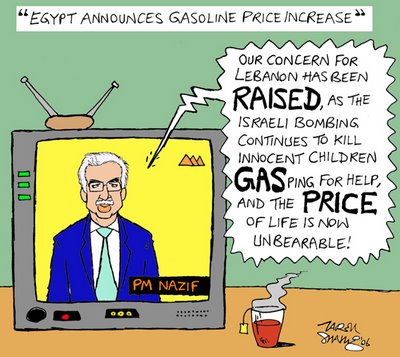The original story, as most media tell it, goes something like this: Hezbollah attacked an Israeli border patrol station, killing six and taking two soldiers hostage. The incident happened on the Lebanese/Israel border in Israeli territory. The alternate version, as explained by several news outlets, tells a bit of a different tale: These sources contend that Israel sent a commando force into southern Lebanon and was subsequently attacked by Hezbollah near the village of Aitaa al-Chaab, well inside Lebanon’s southern territory. It was at this point that an Israel tank was struck by Hezbollah fighters, which resulted in the capture of two Israeli soldiers and the death of six.
If Israel was the one that started this war, then there is no justification for all the woe-is-me we must go after Hizbullah going around. But I remain doubtful: after all, didn’t Nasrallah confirm the excursion into Israel version of events and boast the operation took five months to plan? And why is it not denying the rest of the world’s version of events? If anyone knows different (original Arabic reports best) say so in the comments.
Nasrallah profiled, by the Nation’s Adam Shatz, who’s done good work before. He suggests Nasrallah has a death wish, I’m not so sure. I have a biography of Nasrallah in Cairo that I haven’t read, will do so next week when I get back.
The ICG has a report on the Israel-Palestine-Lebanon crisis. They say “an immediate Israeli-Lebanese ceasefire is necessary: pursuing a military knockout is unrealistic and counterproductive” and aren’t pushing 1559 as an urgent issue like the White House. This is perhaps the most respected think tank on earth, remember.
Today on the train to Casablanca I listened to yesterday’s Democracy Now radio show very interesting interview of Yonatan Shapira, a refusenik Israeli air force pilot, and former Palestinian resistance fighter Bassem Aramim, who co-founded Combatants for Peace with former Palestinian resistance members. It was a really moving interview, I highly recommend it.
From the longest-serving Conservative MP in Britain:
Sir Peter Tapsell, a Tory MP, said Tuesday that British Prime Minister Tony Blair was “colluding” with U.S. President George W. Bush in giving Israel the okay to wage “unlimited war” in Lebanon – a war crime he claimed was “gravely reminiscent of the Nazi atrocity on the Jewish quarter of Warsaw.”
AFP has an article about Egyptians making the parallel between Nasser and Nasrallah, mentioning an Al Arabi headline that said “Nasser 1956 – Nasrallah 2006.” For some reason it reminds me that the London Times (for which I work for) called Nasser (edit: originally wrote “Hitler) “Hitler on the Nile” in 1956, which makes you think about how some papers are describing Nasrallah now. But anyway, Nasrallah’s rising profile around the Arab world is one consequence of this war we may have to live with for a while…
Interesting juxtaposition: the New York Times finds resentment against Hizbullah in Iran but AFP finds that its government is very supportive indeed. I have no idea about Iran but I do find it a bit hard to swallow that there are no ordinary Iranians supportive of Hizbullah (at least none quoted in the NYT story).
This is a little bit old, but here’s the Aardvark on Al Jazeera’s war coverage.
Carnegie Endowment does a roundtable analysis on the current crisis, country-by-country:
One common point emerges clearly from all the analyses, however: the crisis cannot be solved by a single grand strategy that would broaden the conflict to Syria or even Iran and would change the face of the Middle East forever. As in all other crises in the Middle East, at the heart of the problem is the difficult task of negotiating coexistence in a small, overpopulated, and resource-poor part of the world among population groups that have strong identities, different cultures, conflicting interests, and seemingly irreconcilable goals. No grand strategy will alter this most fundamental of Middle East realities.
An Egyptian diplomat has told AFP that Egypt and Saudi Arabia will propose a ceasefire in Rome. The EU has said it will also push for one. As we know they will most likely be ignored. Condi Rice didn’t sound eager to have a ceasefire fast today:
So I will go to Israel, we’ll go to Rome, and I’ll go to Kuala Lumpur for the Asia Regional Forum. I have a little work to do there on North Korea. And I’m fully prepared to return to the region if that would be necessary or helpful. But I’m going to leave David Welch and Elliott Abrams in the region to continue to work on the humanitarian situation as well as the underlying conditions for a cease-fire.
Lebanon reports that four UN peacekeepers were killed today in an Israeli air strike. The UN has confirmed two for now. Kofi Annan says he’s “shocked.” Really, Kofi?
It’s being said that the war will last 10 more days. A lot can happen in 10 days.




